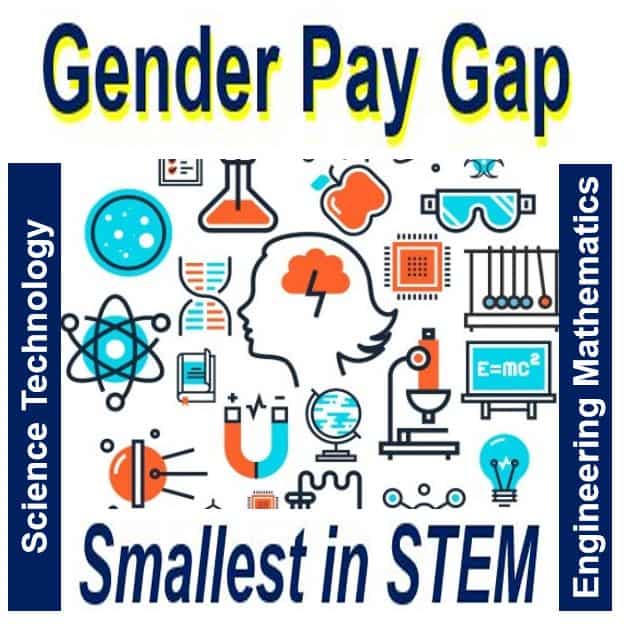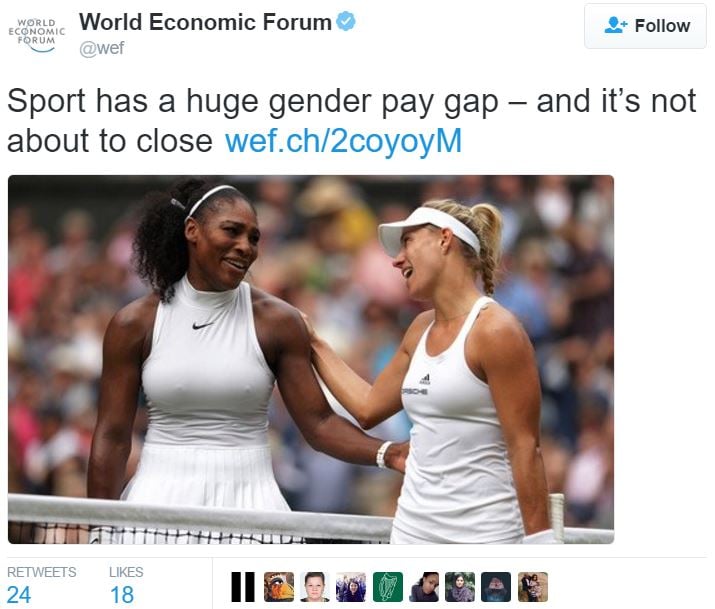The UK’s gender pay gap – the difference between male and female pay – will continue for another five decades, or until 2069, says the business advisory firm Deloitte. An analysis found that the gender pay gap is closing by just 2.5% each year.
If this 2.5% rate continues each year, men and women’s pay will not be identical until 2069, the authors of the report concluded.
Delloite’s analysis was on ONS (Office for National Statistics) data. The male-female gap in full-time median hourly earnings stands today at 9.4%.
 STEM (Science, Technology, Engineering and Mathematics) type jobs have the smallest gender pay gaps. (Image: adapted from deloitte.com)
STEM (Science, Technology, Engineering and Mathematics) type jobs have the smallest gender pay gaps. (Image: adapted from deloitte.com)
Gender pay gap widening in education
There is some alarming news in education and some skilled trades, where the gap is, in fact, widening. Even in teaching and caring – female-dominated occupations – males are paid considerably more. If no action is taken, the gender pay gap will not close for another fifty-three years.
The differences in male and female salaries among people who have studied STEM (Technology, Engineering and Mathematics) subjects, and who go on to work in these sectors, the pay gap is considerably smaller.
In fact, the authors reported that for men and women who studied dentistry, medicine, engineering or technology, there was no difference in the median starting salary.
Factors driving gender pay gap
Emma Codd, Managing Partner for Talent at Deloitte, said regarding the gender pay gap:
“There are many factors that contribute to the gender pay gap. One of these occurs before entering the workforce, when boys and girls decide what to study at school and university. Starting at GCSE level, where three times more boys than girls take computing and 50 percent more boys than girls study design and technology, these early decisions drive fundamental skill differences between the genders for those entering the workplace. The trend is likely to continue unless it is addressed now.”
 There is still a long way to go before the gender pay gap is eradicated completely.
There is still a long way to go before the gender pay gap is eradicated completely.
“We know that the pay gap is far smaller for those women starting their careers in STEM related roles; we also know that high-skilled jobs demanding a blend of cognitive, social and technical skills are typically among the most highly-paid.”
“Therefore, if more women study STEM subjects and pursue related careers they will increase their earnings potential in the early years of their working lives and – should they remain in their careers – the later ones. This in turn should serve to reduce the gender pay gap.”
Encourage girls to study STEM subjects
Ms. Codd says more needs to be done to encourage girls from an earlier age to understand the impact that their choice of subjects can have on their career prospects.
We need to encourage girls to consider a full range of STEM career choices and to have access to role models who can provide insight into these types of career options.
Similarly, with a large number of these women who study STEM subjects but opt for non-STEM careers, businesses that employ STEM-related professionals need to show that they can offer good career prospects for women.
If we do not make an effort, businesses – and the economy in general – will miss out on an extremely valuable pool of potential talent.
Ms. Codd added:
“At Deloitte we are working hard to attract women into our firm at entry level and see engaging with them during their studies as a critical part of this process – we need to ensure that girls understand the importance of the choices they make for GCSE and beyond and that they have access to role models and mentors.”
“We are also focused on ensuring that we provide a working environment where women can thrive at all stages of their career and that this is visible to female students as they make their career choices.”
 The gender pay gap is not only present in the United Kingdom – it is a global phenomenon. According to the World Economic Forum, in sports the gap is ‘huge’. (Image: twitter.com/wef)
The gender pay gap is not only present in the United Kingdom – it is a global phenomenon. According to the World Economic Forum, in sports the gap is ‘huge’. (Image: twitter.com/wef)
Companies can help plug gender pay gap
While policy makers and educators will have to focus on addressing this challenge, we should not under-estimate the impact that employers can make.
Ms. Cobb explained:
“Whether it is providing educators and policymakers with practical insights into career requirements, giving students access to mentors in the STEM professions, or ensuring that the workplace is an environment where women can build successful careers, each business has a part to play.”
“A great deal of progress has been made in the past half century, but we should not wait another 53 years for full parity.”
Only 14.4% of people who work in STEM occupations in the UK are female. According to an analysis of the Labour Market Survey data from 2013, up to 70% of women in with STEM qualifications were not employed in STEM-related industries.

